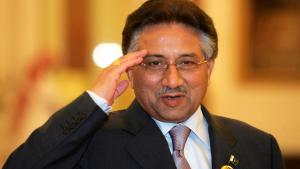Democratic Dictator Updated: February 8th, 2023, 07:30 IST in Edit 0 Pakistan’s ex-President and Army chief General (Retd. ) Pervez Musharraf, 79, passed away in Dubai on February 5, 2023. | Photo Credit: Reuters Share on Facebook Share on Twitter Share on WhatsApp Share on Linkedin T here is no halfway, either in democracy or in dictatorship.
In other words, a hybrid democracy is a dangerous commodity and a recipe for disaster for both the country where it is practised and the person or persons who implement it. One has to go the whole hog, no matter whether one wants to be a dictator or a democrat. This is the lesson offered by the life and legacy of Pakistan’s General Pervez Musharraf who died February 5 at the age of 79 at a hospital in Dubai.
Musharraf was the last military leader to have ruled Pakistan from 1999 to 2008, following a bloodless coup. That coup that had brought him to power was unique in some ways. As the Chief of the Army, Musharraf was away on a visit to Beijing when junior field commanders revolted and carried out the change of power.
Then they called the General and asked him to cut short his China visit and return home immediately. At that time, Pakistani planes were barred from over flying India. That forced Musharraf to fly from China through Sri Lanka back to Islamabad.
When he landed, he was welcomed as the Chief of the country, not just the army. His story is a reflection of Pakistan itself, a country tormented since its creation in 1947 by unrest, assassinations, leaders going into exile to save their lives, fratricidal battles between rival dynasties, economic crises, natural disasters of massive proportions and games played by Western powers. Perhaps, the most remarkable feature of the country’s tryst with democracy and dictatorship is that no Prime Minister could ever complete a term.
Musharraf was the most charismatic leader of Pakistan who was credited with attracting foreign investment to the country that saw the strongest economic growth in nearly 30 years during his rule. It was he who gave a new lease of life to an independent media and sought to free the country from the shackles of bigoted, religious fanatics and extremists. However, the irony of history is that his decade-long rule was also marred by a heavy-handed approach to dissent, arrest of rivals who included top political leaders of the country.
What is even worse is he imposed a nearly six-week-long state of emergency in which he suspended the constitution and censored the media. In fact, he failed to build on his early popularity to carry out sustainable economic and political reforms. On the contrary, he turned into a military dictator and pursued vested interests after his short flirtation with democracy.
It could be his background of being a graduate from a Christian high school that shaped his liberal outlook and he was keen on Pakistan embracing liberal Islam. This very approach endeared him to the West. Subsequently, he joined what Washington called its “war on terror” and gave ground and air access to US armed forces launching attacks on al-Qaeda militants operating in Afghanistan.
However, this decision reversed Pakistan’s long-standing policy of supporting the Taliban, which at that point controlled Afghanistan. As a result, domestic militant groups bayed for his blood and he survived at least four assassination attempts. No wonder the Tehreek-e-Taliban Pakistan, an umbrella group of Pakistani militant organisations formed after Musharraf’s crackdown on extremists, celebrated his death.
In a statement it said, “This was the infamous army chief who sold off the country’s honour and respect. ” Pakistan’s lawmakers and lawyers are also divided on the question of whether respect should be paid to the departed leader since he had targeted both the judiciary and politicians. He was accused of aiding and abetting the assassination of former Prime Minister Benazir Bhutto, killed while on campaign for national elections.
The assessment by Fawad Chaudhury, a former aide of Musharraf and currently a senior leader of former Prime Minister Imran Khan’s party, best describes the former ruler of Pakistan: “He is called a military dictator, but there has never been a stronger democratic system than that under him. ” In the ultimate analysis, Musharraf could be said to be a bundle of contradictions that ultimately sealed his fate. He tried to be a democrat, but ended up becoming a dictator.
He sought to stamp out religious extremists, as was evident in his operation at the Lal Masjid in Islamabad, but gave shelter to Osama bin Laden when the US, his ally, was frantically trying to hound him out. The policy of running with the hare and hunting with the hounds does not pay in the long run. Musharraf’s life best demonstrates this truth while also showing that dual policy did a lot of good for him.
He survived long enough and died a normal death as opposed to the tortuous end he had put some others to. Tags: OP Editorial PERVEZ MUSHARRAF Share Tweet Send Share Suggest A Correction Enter your email to get our daily news in your inbox. Leave this field empty if you’re human: Related Posts Balloon Riddle February 7, 2023 Myanmar Mess February 6, 2023 Detached From Reality February 5, 2023 Yogi’s Ambitions February 4, 2023 Tel Aviv Tightrope February 1, 2023 Ukraine’s Twin Wars January 31, 2023 Leave a Reply Cancel reply Your email address will not be published.
Required fields are marked * Comment * Name * Email * Website Save my name, email, and website in this browser for the next time I comment. Δ.
From: orissapost
URL: https://www.orissapost.com/democratic-dictator/



